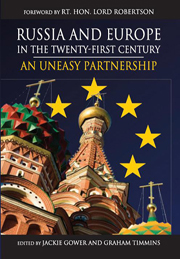Book contents
- Frontmatter
- Contents
- List of Contributors
- Acknowledgements
- List of Abbreviations/Acronyms
- Foreword Russia and Europe
- Preface
- Introduction Russia and Europe: What Kind of Partnership?
- PART 1 Russia looking West
- Chapter 1 Vladimir Putin and Russian Foreign Policy towards the West: Towards a New Realism
- Chapter 2 The ‘Normalization’ of Russian Politics and Europe
- Chapter 3 The Russian Elite Perspective on European Relations
- Chapter 4 Domestic Politics and Foreign Policy Formulation
- Chapter 5 Russia's Regions in Shaping National Foreign Policy
- Chapter 6 The Russian Military and European Security Cooperation
- PART 2 Europe looking East
- PART 3 Partnership in Practice
- Conclusion Russia and Europe: An Uneasy Partnership 289
- Index
- More Titles in this series
Chapter 2 - The ‘Normalization’ of Russian Politics and Europe
from PART 1 - Russia looking West
Published online by Cambridge University Press: 05 March 2012
- Frontmatter
- Contents
- List of Contributors
- Acknowledgements
- List of Abbreviations/Acronyms
- Foreword Russia and Europe
- Preface
- Introduction Russia and Europe: What Kind of Partnership?
- PART 1 Russia looking West
- Chapter 1 Vladimir Putin and Russian Foreign Policy towards the West: Towards a New Realism
- Chapter 2 The ‘Normalization’ of Russian Politics and Europe
- Chapter 3 The Russian Elite Perspective on European Relations
- Chapter 4 Domestic Politics and Foreign Policy Formulation
- Chapter 5 Russia's Regions in Shaping National Foreign Policy
- Chapter 6 The Russian Military and European Security Cooperation
- PART 2 Europe looking East
- PART 3 Partnership in Practice
- Conclusion Russia and Europe: An Uneasy Partnership 289
- Index
- More Titles in this series
Summary
Introduction
Russia's relations with Europe depend on more than the diplomatic and the foreign policy positions adopted by contemporary governments. Over the longer term, Russia's relations with Europe depend on two factors: the development of Russia's socio-economic system and political regime, and the way that the development of Russian society and polity relate to the changes that are being wrought in Europe by processes of integration within the European Union (EU). The relationship between these two factors and how they impact on European-Russian relations is both complex and indeterminate; quite simply, relations could go in a variety of directions.
The complexity of the relationship between Russia's development and Europe's is understandable; many other factors and forces, not least domestic pressures in Russia and European states and the continued evolution of the post-Cold War global order and the wider ‘Western’ interaction with Russia mediate the influence of each on the other.
The indeterminate nature of relations is harder to understand. Developments in Russia and in Europe would seem to be leading to a steady improvement of relations between the two and to the creation of conditions that should guarantee continued incremental improvement. Despite setbacks to further integration (such as delays to the adoption of an EU Constitution) or disagreements over how to deal with extra-European foreign policy issues (such as the Iraq war), Europe as the EU is arguably developing as a civilian superpower, different from state actors in the international system because of its commitment to peace, democracy, human rights and foreign relations based on responsibility rather than self-interest.
- Type
- Chapter
- Information
- Russia and Europe in the Twenty-First CenturyAn Uneasy Partnership, pp. 23 - 40Publisher: Anthem PressPrint publication year: 2007



